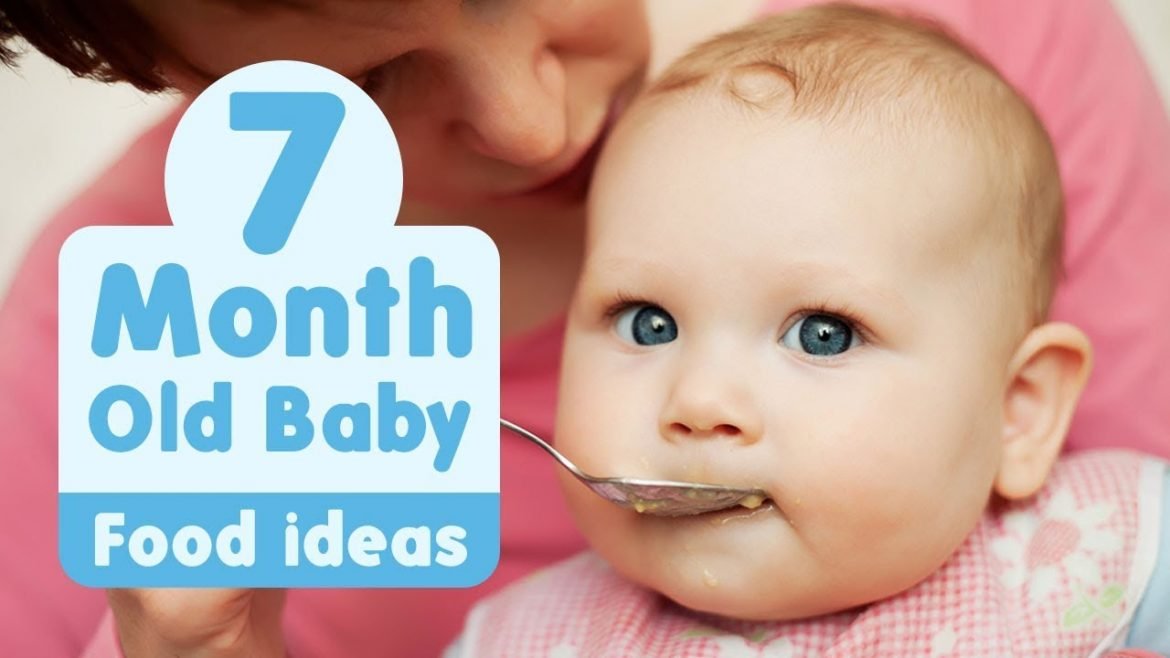So now your baby is seven months old and is showing a maximum number of development signs and growth sprouts with every passing day. As your baby is preparing himself for crawling, you are in the phase of getting your house ready for a child-proof environment. We know you must have already made your house for safety measures, so it’s expected to see some furniture and interior changings in the house.
Along with these above changes, you are also working on your baby’s food plans and searching more ideas and options for your baby’s solid meals. Your baby is more in height and weight than he was a few months ago and he is developing more sensory improvements. The baby can see and hear everything clear around him, and he is trying to respond more with small sounds to people around him.
What to feed your seven months old baby?
As your baby has grown up more than the last month, he is asking for more solid times in his meal schedule. You may find him grabbing or snatching your food from hands while having your food and find it amusing to see. It’s a clear sign that your baby is asking for more food so you should probably look up to more options for your baby’s solids meals.
Below are some useful and adaptable tips for your baby food plan to add up some new foods into your seven months old baby food chart.
- Banana Puree: Also called the perfect food, bananas are meant to be the exact food what babies need at this age. Bananas are rich in fibre and potassium and are nature’s anti-acids that are light on the baby’s stomach. We may call bananas the perfect food but be careful not to overdo them as they can cause constipation to your baby. Banana flavoured puree or mashed bananas are a great extra munching meal for your baby in case he is feeling hungry at a different time.
- Brown rice cereal: Cereals are high starter foods for babies and must be given in different flavours or forms to keep your baby attached to their character. Rice cereals work great with your baby’s hunger and if you find your baby getting tired of the same flavour every day, try brown rice cereal for more flavour variety. It will help your baby to get into thicker solids than liquid meals.
- Baked sweet potato puree: if we talk about amazing, we come to mention potatoes. As we know, vegetables are rich in vitamins, antioxidants, and fibre; they make an excellent meal for your baby. If your baby doesn’t want a simple mashed or boiled potato meal, try making some baked sweet potato puree for him to transition him to thicker food.
- Carrots: We know you have been giving your baby some boiled carrots to start up to solids, but now your baby may be tired from the same meal. Carrots are called an excellent introduction to solids, and their naturally sweet taste makes your baby happy with a few bites. Try making some puree or combinational foods like carrot and pumpkin puree or mashed carrots with sweet potatoes for your baby. It will help with your options for your baby’s solids.
There are some specific foods like bananas, carrots, peas, squash, broccoli and cereals, that work great during the months of 4-6 for your baby. It’s better to keep these foods regular until your baby reaches his 7-8months so can bring in more thick solids into their routine.
What precautions should be there while feeding your baby?
We may have learnt about several options and meals for your baby, but it’s also essential to know how what and when to feed your baby the right solids. As you know your baby has lost his tongue reflex which throws the food out naturally until your baby turns six months old and now your baby is trying to put everything in his mouth; you need to make sure you are not providing any choking foods in your baby’s hands.
Mothers may start some foods for babies, but they must make sure not every edible is handed to them like grapes, pomegranate, raw hard vegetables, popcorn, candies, chunks of meat, etc. babies get conscious of their surroundings more when they start solids and wish to observe everything edible or non-edible while tasting them. It’s essential to keep your supervision around your baby, especially while setting him around the dinner table.
Quantity and quality matters
Flavoured and artificial foods should not be there at all costs along with cow milk and raw honey for your baby. Natural fruits and vegetables should be preferred whenever choosing a meal for your baby if you wish to see him grow rapidly and adequately. We can easily find natural-based products for babies in supermarkets, but the best option will always be home-made natural meals and puree for your baby.
In the beginning, make sure you don’t overload your baby with solids and keep low quantity until your baby gets used to them. Serve one stable per day from the start and extend to two meals from the second week. You can go three times a day till your baby completes his 4-6 months and you can add extra snack times after his seventh month. Do not forget to keep your baby’s milk intake in check as it’s an essential part of his growth.
To know more, click here
